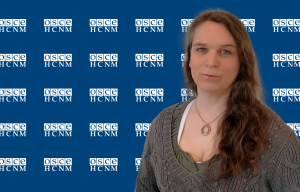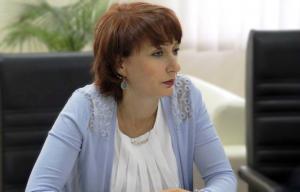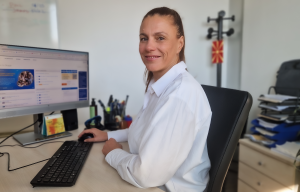Rasmiya Kazimova
Deputy Director for Human Resources - OSCE Secretariat
Can you share a bit about where you've worked before joining the OSCE and what your responsibilities were?
Prior to joining the OSCE, I was very fortunate to benefit from multiple opportunities to gain leadership, project management, fund-raising, coordination, teaching and expert-level advisory working experience in public and private sector, governmental and non-governmental.
As such, I have worked in state oil and petrochemical companies, private legal and risk management companies, government, and academia. The latter, and in particular, the University of Essex was instrumental in shaping me both as a professional and as a person, including in terms of values. It was a place, where I could not only study, but also put my expertise into practice, having contributed to its key research projects, teaching and consultancy on business and human rights
What’s your academic background, and how does it connect with the career you’ve built?
It was a combination of academic knowledge and the work experience I had gained in my previous roles that helped me take the next step on the career ladder.
I always knew that I wanted to be a lawyer and I felt that I was the happiest when my work made a positive difference for people. So, it was only a matter of time that I chose to specialize as a human rights lawyer. As a result, I graduated from Baku State University with LLB and LLM in International Law, and with LLM in International Human Rights Law from the University of Essex. Since then, my interest in making a positive difference for individuals never waned, but it did get more multi-faceted though.
For instance, it was the interest in the topic of the human right to a healthy environment together with my (by then) experience in the oil and petrochemical industry, as well teaching, research and consultancy experience on business and human rights that led me to a decision to do PhD in Law at the University of Essex, focused on sustainable development. In turn, later on, that combined experience was instrumental in getting a job in a risk management company, advising companies on how to manage the human rights impact of their business activities, particularly in developing countries.
By the time I joined the OSCE, I had the regional and managerial experience, and thematic expertise to make a difference in two out of three OSCE dimensions, and my specialization in international law, work in government and experience leading negotiations with big private companies, prepared me for entering the diplomatic world. In turn, almost a decade in OSCE had added its own brush strokes to my profile, including the knowledge of the last of the three dimensions and new OSCE regions, and different and more complex experience managing people and people issues.
Where are you based now, and what do you enjoy most about your current role at the OSCE?
Presently, I work as Deputy Director for Human Resources at the Secretariat. There are several things that kick me out of bed every morning. First, that my job is again about people and that it offers yet another lens on how to make a positive difference for humans. Second, that I can contribute with my niche expertise and experience to the work of DHR. Third, I absolutely love my DHR team, who, on the one hand, challenge me professionally but, on the other, offer me a safe space to be me. And finally, DHR has offered me a continuous learning curve together with mentors and friends, who have been interested in my success, and who have made this intensive learning experience a pleasure to embrace.
What advice would you give to those thinking about a career in international civil service?
To be honest, when I joined OSCE, I did not see this as a start of a career in international civil service. I perceived it, first and foremost, as a school for honing diplomatic skills, and only then as a place where I can put to use my expertise and experience.
It has been an interesting journey, I must admit, but it was not easy. Sometimes, it felt like being a rock in a tumbler, with the polishing leaving you in pain with lots of tears. That said, I have never regretted a single minute on that ride, nor the decisions that made my path more difficult than it could have been.
The key take-away from almost a decade at the OSCE for me is how difficult but also how important it is to maintain impartiality, independence and fairness in decision making, and to consistently show professionalism and integrity. Those skills are very important in international civil service, where national interests of member States do not always align, but they are highly transferrable to every other aspect of life. If you get good at it, you won’t be liked by all, but you would certainly command respect. If this is what one wants to feel about themselves at work, then my advice would be ‘dive into it’.


